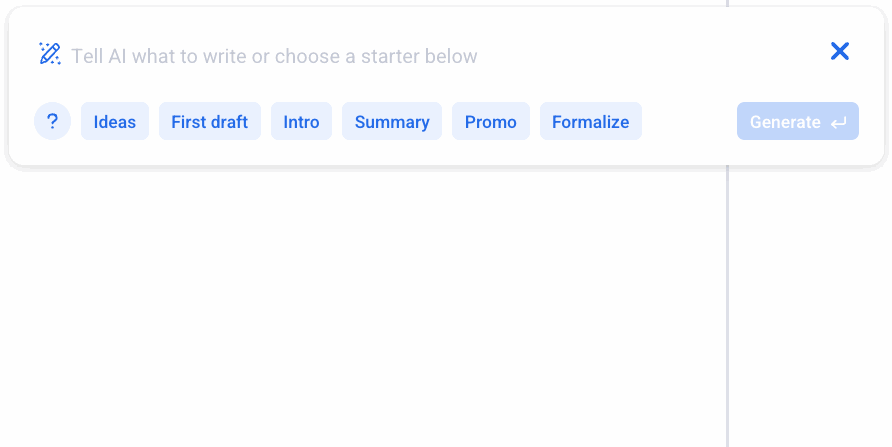From stuck to sent: 7 Strategies to overcome email writer’s block
By Kaleigh Moore July 13, 2023
Have you ever sat down to write something and felt…totally stumped?
Ah, yes. It’s the dreaded writer’s block.
I know the feeling all too well. Just a few weeks ago, I was sitting at my desk, staring at a blinking cursor, desperately willing it to conjure up the words that seemed to have escaped me. My mind was blank.
After hours of torturing myself, I realized I needed a break and decided to do something productive. So I threw on my comfiest sweats, cranked up my Spotify playlist, and decided to tackle reorganizing my kitchen pantry.
This unrelated, mindless task allowed me to step away from the task and cleared some brain space so that when I sat back down at the computer, the words just flowed. It was as if the simple act of decluttering my physical space was clearing the cobwebs from my mind. Who knew?
It struck me that sometimes, to regain our creative spark, we need to break from the routine and engage in a different type of activity.
Data backs this up, as researchers have found the top three reasons for writer’s block are attributed to stress, fear, or perfectionism. So, while cleaning and organizing may not be your preferred go-to method to combat these issues, the key is to find something that does allow your thoughts to wander freely so you can get out of your own way.
Here are some ideas to try the next time you’re facing a blank screen.
1 – Change your scenery
Sometimes, when writer’s block hits hard, the best thing you can do is step away from your desk and shift your focus. Taking a break and immersing yourself in a different environment can work wonders for your creativity. This can be as simple as:
- Taking a leisurely walk in the park
- Finding a cozy spot in nature where you can observe things quietly
- Playing games with your pet or your family/friends
- Exercising
2 – Set your timer
A time crunch can be a double-edged sword when dealing with writer’s block–it can constrain us or inspire us. But it can also be a useful tool. The Pomodoro Technique, a method of dividing writing into dedicated blocks of time, has proven effective for many, myself included. Here’s how to implement it:
- Set your timer for 25 minutes.
- During this focused period, write without worrying about perfection. The aim is to get your thoughts out of your head and onto the page, minimizing distractions. I love to incorporate music into my Pomodoro sessions. By selecting instrumental tracks or ambient music, I find that it helps me stay focused and in the creative flow during these writing blocks.
- After the 25 minutes, take a short break of five minutes to recharge and refresh your mind.
- Repeat the cycle of 25 minutes of writing and five minutes of rest as needed until your project is completed.
By breaking your writing into these bite-sized sessions, you create a sense of urgency and structure that can unlock the flow of your creativity. Remember, the goal is progress, not perfection.
3 – Call your friends and family
Don’t hesitate to connect with friends or anyone who can give you some creative inspiration when you’re in need. Reaching out for support or advice is nothing to be ashamed of. We all face moments of self-doubt, but it’s important to recognize that seeking input from others can be incredibly beneficial.
Personally, I’ve found that a collaborative brainstorming session often leads to breakthrough moments and innovative solutions that I wouldn’t have discovered on my own.
4 – Start with an off-topic sentence or phrase
For many people (including me) blank “paper” or its online equivalent can make my brain turn to mush. Even if I sat down with a zillion ideas, getting that first sentence out can be awful.
But there is a technique for overcoming the blank paper conundrum.
When you sit down to write your email, if you can’t figure out what to say, just start writing. My preferred method is to write something silly and usually completely off topic, and then the writing often starts to flow. So I might write “Elephants don’t have fuzzy skin” or something nonsensical like that.
You then simply go back and edit out the strange stuff and keep the rest.
Try it, it works for lots of writers, including me.
5 – When in doubt, split test!
A lot of times writer’s block comes from worry. In a writer’s brain they are wondering “Will this work?” and then they get stuck.
That’s why I split test. I don’t always know what is going to work or not. But if I split test, then I don’t have to worry about it.
One of the most important areas of your email to split test is your subject line, and most email marketing providers let you do this with ease. It influences open rates more than any other element.
By split testing different subject lines you can keep track of which ones work for your audience and reference those subject lines for future email ideas and angles. For example, I may find that “how to” subject lines perform the best, so I’ll make sure to use those more frequently.
6 – Plan ahead
Plan your writing ahead of time using a simple email calendar. This can help you save time thinking of things to write about. By spending a little more time upfront planning out your emails, you’ll save time brainstorming in the moment.
Plus if you know what email topics are coming up, something you’re doing in your day to day activities might spark an idea.
7 – Embrace AI tools
Don’t overlook the power of AI (artificial intelligence) as a helpful backup. AI tools can be a great way to overcome writer’s block.
They can provide inspiration, generating ideas, and enhancing the writing process.
AI can also help you in generating outlines, structuring content, and even offering suggestions for sentence construction or word choice.
If you’re not sure how to ask an AI, there are several guides of AI email prompts that can help generate the best results and enhance your emails.
These tools can help break through the initial creative block and provide valuable support, enabling you to overcome your writer’s block and produce high-quality content more efficiently.
When you need a little inspiration
AWeber offers a built-in AI writing assistant that can be a lifesaver when you’re low on inspiration.
With just a few clicks, you can generate a first draft on your desired topic, and let the AI assist you as an editor and writing companion. It’s an incredible way to collaborate with technology to enhance your content creation.
Try it out in your email message editor today – just type / to start. You can ask AI a question or begin with one of our prepopulated prompts.

Check out what some users had to say:
“This is so awesome — it’s definitely got my creative juices flowing” -Shawn B.
“You can’t edit within Chat GPT, you have to copy and paste it. This will make writing a lot easier with a built-in tool.” – Wyatt S.
“I think this has better output than a lot of the AI I’ve seen — it seems more natural.” – Steve W.
“I’ve spent 25 years describing what we do in many different ways in advertising emails, conference presentations, etc. In about 20 seconds it described it more succinctly than I’ve ever done in 25 years!” – Cindy G
You’re not alone
When it comes to writer’s block even the most accomplished authors experience it. Check out how these two email writer’s overcome their bouts with the occasional blinking cursor.
So it’s time to overcome your writer’s block, one great way to conquer the blank screen is to use AWeber’s AI writing assistant. If you don’t have an AWeber account, you can sign up for free.
What techniques have helped you overcome writer’s block? Share them in the comments below.
 87% off ends soon!
87% off ends soon! 
